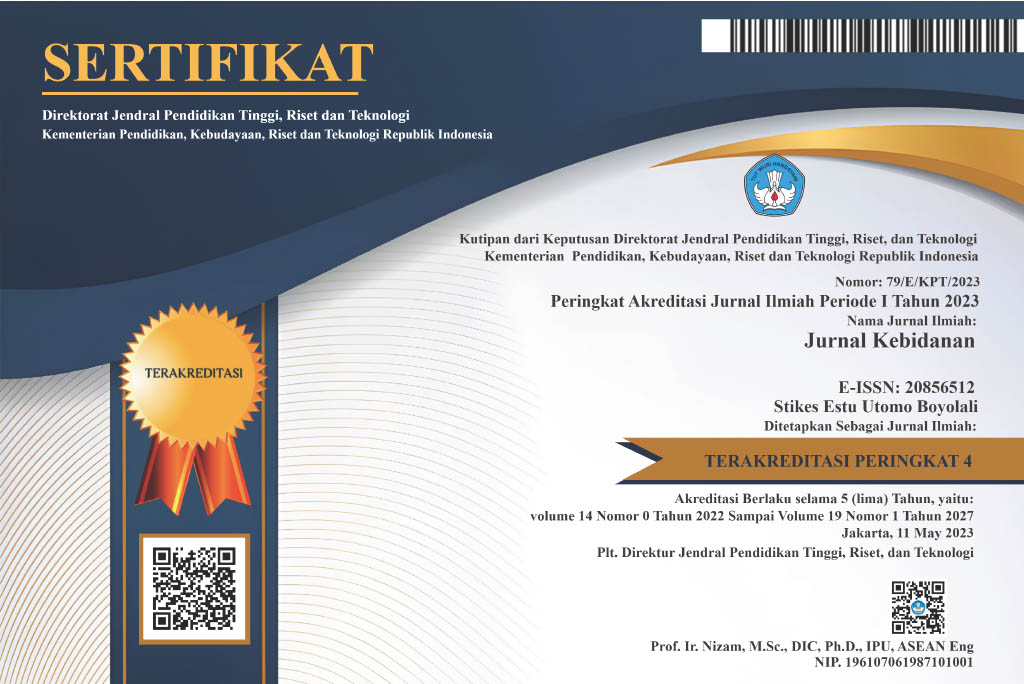-
Ani Hartanti
Prodi D3 Kebidanan Stkes Estu Utomo Boyolali
Abstract
ABSTRAKDi Indonesia, infeksi HIV merupakan salah satu masalah kesehatan utama dan salah satu penyakit menular yang dapat mempengaruhi kematian ibu dan anak. Pengidap HIV/AIDS di Indonesia dari tahun ketahun terus mengalami peningkatan. Tidak sedikit pengidap virus mematikan ini adalah mereka yang masih tergolong anak-anak, yaitu yang berusia antara delapan hingga delapan belas tahun. Tujuan dalam penelitian ini untuk menganalisis perilaku care giver dalam pengobatan ARV pada anak dengan HIV/AIDS, yang meliputi: Karakteristik responden, pengetahuan, sikap, tradisi kepercayaan, akses terhadap pelayanan CST, dukungan tenaga kesehatan, dukungan keluarga, dan dukungan teman sebaya. Metode penelitian adalah kualitatif dengan pendekatan studi kasus. Melalui wawancara mendalam dan focus group discussion. Subjek penelitian ini adalah care giver yaitu 4 orang ibu dan 1 orang paman. Analisis berdasarkan tema (thematic content analysis). Hasil penelitian menunjukkan bahwa 4 informan merupakan ibu dari anak dengan HIV/AIDS dan 1 informan adalah paman dari anak dengan HIV/AIDS. Usia anak dengan HIV antara 23 bulan - 13 tahun. Tidak ada perbedaan pengetahuan care giver tentang pengobatan ARV antara anak yang diasuh oleh ibu dan yang diasuh oleh paman. Ada perbedaan antara sikap informan dan keluarga antara anak balita dengan anak usia sekolah. Tidak ada perbedaan akses pelayanan anak dengan HIV/AIDS antara anak yang diasuh oleh ibu dan yang diasuh oleh paman. Perilaku care giver dalam pengobatan ARV dapat terkendala oleh keterjangkauan fasilitas pelayanan kesehatan, pekerjaan care giver serta hubungan keluarga care giver dengan anak dengan HIV/AIDS.Dukungan petugas kesehatan, keluarga, dan teman sebaya diberikan dengan memberikan pelayanan dan konseling dengan baik, selain itu keluarga juga memberikan dukungan moral dan spiritual kepada anak dengan HIV∕AIDS. Kata Kunci : Pengobatan ARV, HIV/ AIDS CARE GIVER BEHAVIOR IN ARV TREATMENT FOR CHILDREN WITH HIV / AIDSABSTRACTIn Indonesia, HIV infection is one of the major health problems and an infectious disease that can affect maternal and child mortality. People living with HIV / AIDS in Indonesia from year to year continue to increase. Not a few people with this deadly virus are those who are still classified as children, which are aged between eight to eighteen years. The objectives of this study were to analyze the behavior of care giver in the treatment of antiretroviral drugs in children with HIV / AIDS, which include: Respondent characteristics, knowledge, attitudes, traditions of trust, access to CST services, support of health workers, family support, and peer support. The research method is qualitative with case study approach. Through in-depth interviews and focus group discussions. Subject of this research is care giver that is 4 mother and 1 person uncle. The thematic content analysis. The results showed that 4 informants were mothers of children with HIV / AIDS and 1 informant was uncle of child with HIV / AIDS. Age of children with HIV between 23 months - 13 years.There is no difference in the care giver knowledge of ARV treatment between the child being cared for by the mother and being cared for by the uncle. There is a difference between informant and family attitudes between toddlers and school-aged children. There is no difference in the access of child labor with HIV / AIDS between the child being cared for by the mother and being cared for by the uncle. Care giver behavior in antiretroviral treatment can be constrained by the affordability of health care facilities, care giver work and care giver family relationships with children with HIV / AIDS. Support from health, family, and peers is provided by providing services and counseling well, and the family also provides moral and spiritual support to children with HIV / AIDS. Keywords: ARV Treatment, HIV/AIDSABSTRAKDi Indonesia, infeksi HIV merupakan salah satu masalah kesehatan utama dan salah satu penyakit menular yang dapat mempengaruhi kematian ibu dan anak. Pengidap HIV/AIDS di Indonesia dari tahun ketahun terus mengalami peningkatan. Tidak sedikit pengidap virus mematikan ini adalah mereka yang masih tergolong anak-anak, yaitu yang berusia antara delapan hingga delapan belas tahun. Tujuan dalam penelitian ini untuk menganalisis perilaku care giver dalam pengobatan ARV pada anak dengan HIV/AIDS, yang meliputi: Karakteristik responden, pengetahuan, sikap, tradisi kepercayaan, akses terhadap pelayanan CST, dukungan tenaga kesehatan, dukungan keluarga, dan dukungan teman sebaya. Metode penelitian adalah kualitatif dengan pendekatan studi kasus. Melalui wawancara mendalam dan focus group discussion. Subjek penelitian ini adalah care giver yaitu 4 orang ibu dan 1 orang paman. Analisis berdasarkan tema (thematic content analysis). Hasil penelitian menunjukkan bahwa 4 informan merupakan ibu dari anak dengan HIV/AIDS dan 1 informan adalah paman dari anak dengan HIV/AIDS. Usia anak dengan HIV antara 23 bulan - 13 tahun. Tidak ada perbedaan pengetahuan care giver tentang pengobatan ARV antara anak yang diasuh oleh ibu dan yang diasuh oleh paman. Ada perbedaan antara sikap informan dan keluarga antara anak balita dengan anak usia sekolah. Tidak ada perbedaan akses pelayanan anak dengan HIV/AIDS antara anak yang diasuh oleh ibu dan yang diasuh oleh paman. Perilaku care giver dalam pengobatan ARV dapat terkendala oleh keterjangkauan fasilitas pelayanan kesehatan, pekerjaan care giver serta hubungan keluarga care giver dengan anak dengan HIV/AIDS.Dukungan petugas kesehatan, keluarga, dan teman sebaya diberikan dengan memberikan pelayanan dan konseling dengan baik, selain itu keluarga juga memberikan dukungan moral dan spiritual kepada anak dengan HIV∕AIDS. Kata Kunci : Pengobatan ARV, HIV/ AIDS CARE GIVER BEHAVIOR IN ARV TREATMENT FOR CHILDREN WITH HIV / AIDSABSTRACTIn Indonesia, HIV infection is one of the major health problems and an infectious disease that can affect maternal and child mortality. People living with HIV / AIDS in Indonesia from year to year continue to increase. Not a few people with this deadly virus are those who are still classified as children, which are aged between eight to eighteen years. The objectives of this study were to analyze the behavior of care giver in the treatment of antiretroviral drugs in children with HIV / AIDS, which include: Respondent characteristics, knowledge, attitudes, traditions of trust, access to CST services, support of health workers, family support, and peer support. The research method is qualitative with case study approach. Through in-depth interviews and focus group discussions. Subject of this research is care giver that is 4 mother and 1 person uncle. The thematic content analysis. The results showed that 4 informants were mothers of children with HIV / AIDS and 1 informant was uncle of child with HIV / AIDS. Age of children with HIV between 23 months - 13 years.There is no difference in the care giver knowledge of ARV treatment between the child being cared for by the mother and being cared for by the uncle. There is a difference between informant and family attitudes between toddlers and school-aged children. There is no difference in the access of child labor with HIV / AIDS between the child being cared for by the mother and being cared for by the uncle. Care giver behavior in antiretroviral treatment can be constrained by the affordability of health care facilities, care giver work and care giver family relationships with children with HIV / AIDS. Support from health, family, and peers is provided by providing services and counseling well, and the family also provides moral and spiritual support to children with HIV / AIDS. Jurnal Kebidanan, Vol. IX, No. 01, Juni 2017                                                                  43              Keywords: ARV Treatment, HIV/AID







.png)










